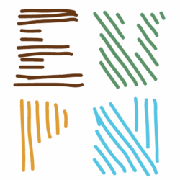Hi European Permie Friends :)
We (Jillian Hovey and Ben Burnley) have been on the ground in The Casamance, which is the southern Senega, and the “bread basket” of that country as the desert has advanced all through the north. We are working with a team of locals, several of whom took an EDE (Ecovillage Design Education) and PDC with Jillian and other international & African teachers in The Gambia 2015, which they say was a life-changing experience. With some on-going support from Jillian, they hosted a Casamance Permaculture Convergence in 2016. And most recently, they formed the REPCA Permaculture and Ecovillage Network of Casamance, which grew out of their dream to unite their efforts and to share what they have learned to help their communities.
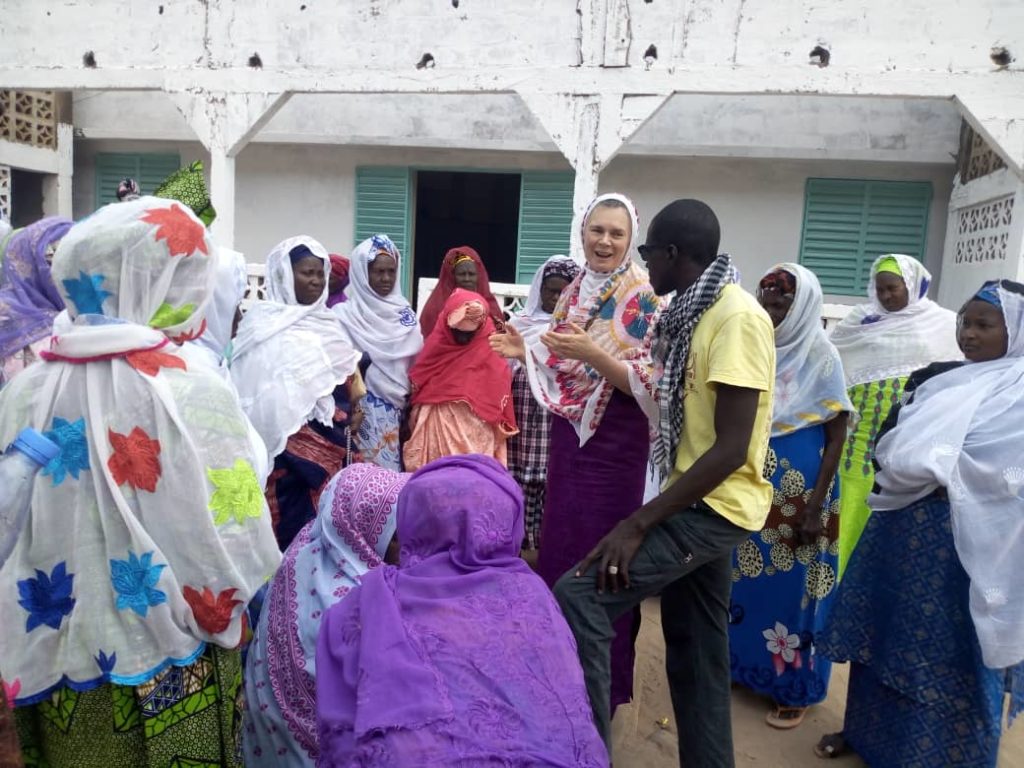 Meeting with Elder Women of Kabadio Village, The Casamance, Senegal, February 2019
Meeting with Elder Women of Kabadio Village, The Casamance, Senegal, February 2019As well as continuing to develop their various permaculture sites, the local leadership team is hosting the first EDE in French in West Africa, with our support. As the EDE is about wholistic integrated design, we felt that it was a good fit to include the material for a Permaculture Design Course (PDC) in the Ecovillage Design Education (EDE) course curriculum, which Jillian has done twice before. The programme with be four and a half weeks, starting the third week of October, and running to just before the Global Ecovillage Network (GEN) Africa conference starts November 27th.
The GEN-Africa conference will be hosted by the Sandele Foundation, just across the river in The Gambia (a former English colony). They will be hosting an English-language EDE at the same time that we holding our French language course, and are our partners in mounting this project, drawing for their experience of hosting two EDEs and a PDC in 2014 & 2015. We are sharing resources with them as we are co-create a course which combines the EDE and PDC content into a meaningful curriculum adapted to West Africa, and co-led with African facilitators.
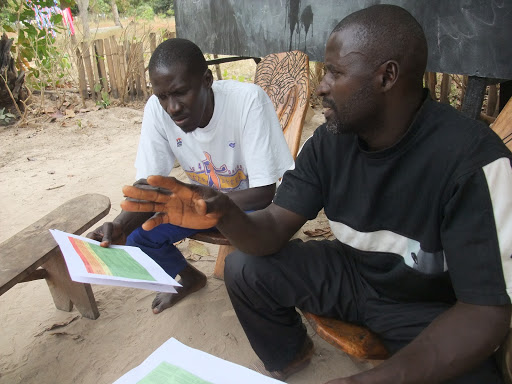 Discussing the curriculum design in Mandinka - the local language that is underneath the colonial languages of French and English which divide the land into The Gambia and Senegal
Discussing the curriculum design in Mandinka - the local language that is underneath the colonial languages of French and English which divide the land into The Gambia and SenegalAs well as developing the local and bioregional team, we are connecting with community leaders from neighbouring countries and across West Africa. We see the potential for a West African Permaculture and Ecovillage Network. We would love to have funds to invite them to attend this training, and some as members of the facilitation team. This initiative is a part of the Francophone Permaculture community internationally. We are creating educational materials to share with the francophone world and would love to have help with that and receive other people’s French-language teaching resources. There will also be places on this course for Francophones to attend from other parts of the world (and for English-speakers, there is the EDE across the river in The Gambia).
A very interesting aspect of this project is that there are two colonial languages right beside each other in the local bioregion, as The Gambia (a former British colony) is completely surrounded by Senegal (a former French colony). The Gambia is a very small thin country whose territory was largely defined the the land on either side of the river which could be reached by cannon shot from the English ships, as there was a significant trade in African slaves. Dakar in Senegal is the western-most point in Africa and was also a focal point for the slave trade to the Caribbean and America. Jillian went to the “House of Slaves” at Goree Island off Dakar at the GEN-Africa conference there in 2014, and says it was impactful and somewhat surreal to be there with our African friends.
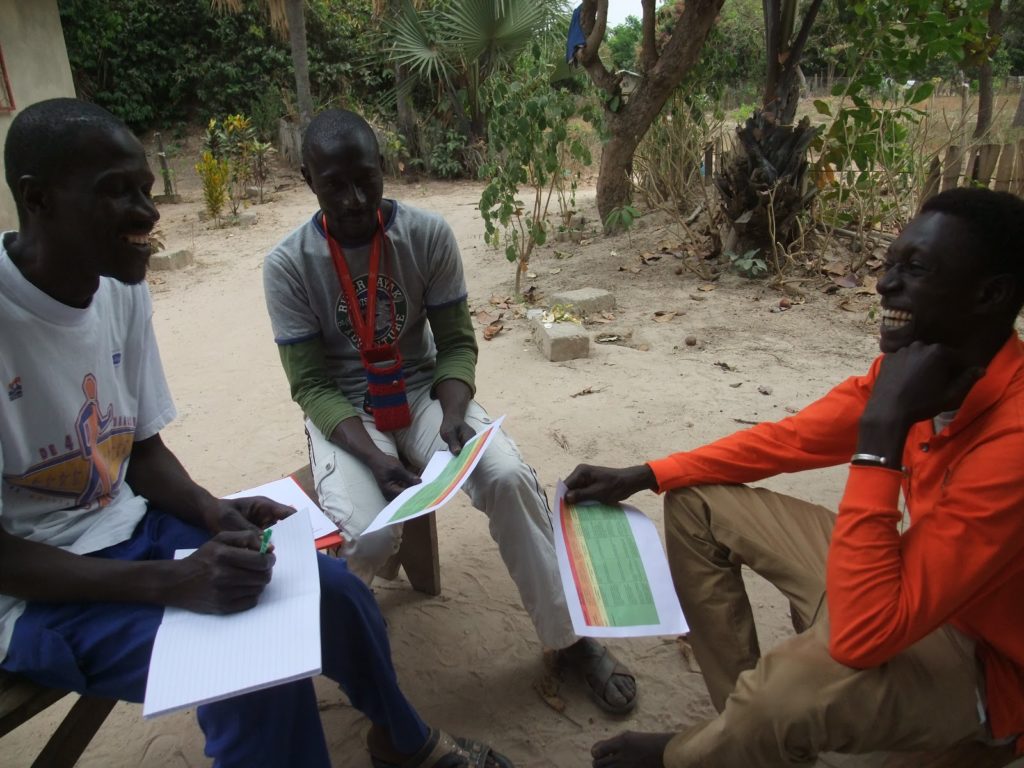
Having fun at the “Training of Trainers” to develop an integrated EDE & PDC, Kabadio, The Casamance, Senegal
Our project is on the coast, just across the river that is The Gambia’s southern border. People on either side of that little river that divides them speak different colonial languages as their second language. But most share a common mother tongue as they were one people in the Mandinka Kingdom which existed before European contact. People in both countries, on both sides of the river, are inter-married, even though they don’t speak the colonial of the other’s birth country. So for the training of tutors for this course, we included people with capacity from the English side of the border in The Gambia, and gave space and encouragement for them to process in their native language all throughout the training, which was very successful. We hope that in the coming years they will lead these courses without us, in their native languages (and continue to step into their power to design and lead courses that make real sense for the locations). Teaching in the local language also helps the women, who do most of the land work, as they often don’t speak the colonial language.
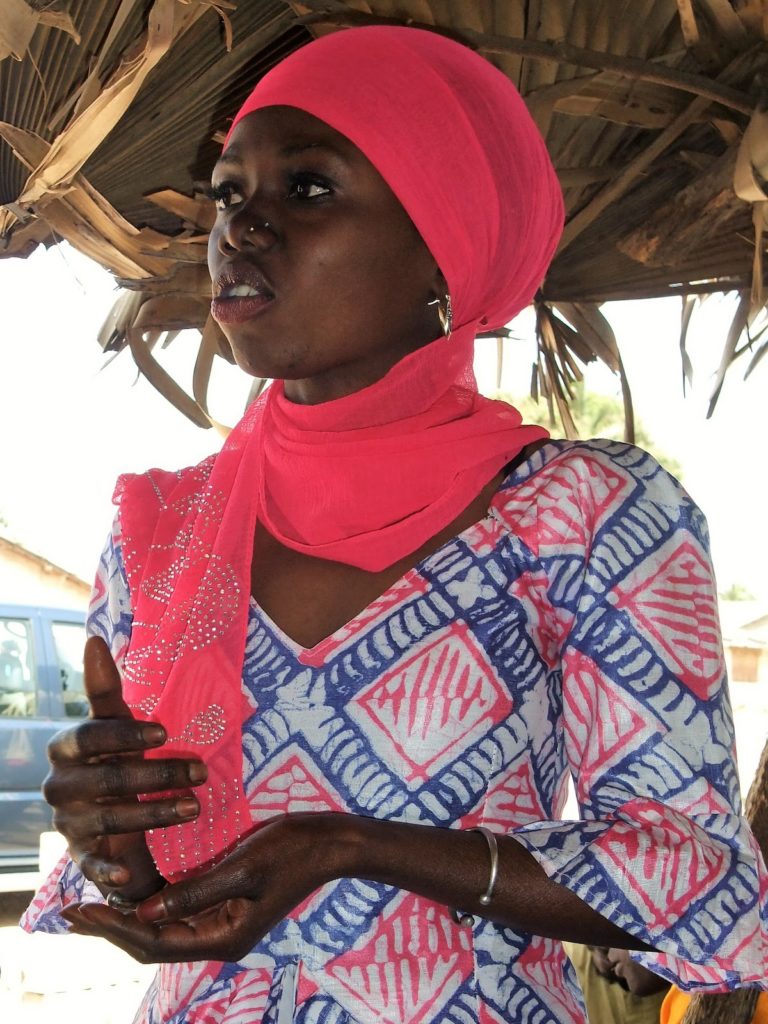
Support Local Leadership of Women, especially the next generation coming up.
This is the third time in Africa for both Ben and Jillian, and this project is a dream that we have shared since we met during the European Permaculture Teachers’ Alliance meetings from 2012 - 2014. Those conversations also include Kipper Fischer of SONED in Germany, and Andy Goldring of PAB in England. Jillian joins from The Sustainable Living Network in Canada, and Ben from La Caravane de Permaculture in France. Ben says that he has been learning a lot from being in Africa - about the land and the culture, and also leaning about himself, especially through the mentorship of Jillian, who has worked in 35 countries across 5 continents and helps people to see themselves and others in their permaculture work. Jillian says: that she is always learning, and over the past few years since first living in Africa, has been reflecting a lot on decolonisation. It is a privilege to learn from and support the people of this bioregion, and we have the potential of manifesting real possibility for regenerative practices.
For those of you reading this: there is plenty of opportunity to be involved - internships, volunteering from afar, networking for funding, translation, web design, etc. We need your help, and we need financial contributions now! We are funding this out of our own pockets (which are not very deep), including purchasing much needed supplies. There is a fence to put up at the Youth Centre to close out the grazing animals so we can start a permaculture landscape which will be fed by this year’s rainy season. This project has potential for a large region, for generations to come, so please reach out to lend your support - no amount is too small!
You will find more info on www.REPCASAMANCE.ORG in about a month, but for now you can “Like” and start the conversation on the Facebook page created by the locals. You can also email us at repcasamance [at] gmail [dot] com (repcasamance[at]gmail[dot]com); Benjamin Burnley can be reached at benjaminburnley52 [at] gmail [dot] com (benjaminburnley52[at]gmail[dot]com), and Jillian Hovey can be reached at jillian [at] permaculture [dot] net (jillian[at]permaculture[dot]net) . And we plan to get a crowdfunding campaign going soon (and can use some help), but in the meantime, we can take donations by bank transfer in Europe and by PayPal.
Planetary healing will take all of us. For now, we Permaculturalists have some understanding of what needs to be done to help nature (and ourselves) back to health. The knowledge and consciousness will grow. We welcome your support, and look forward to hearing from you. Thank you!
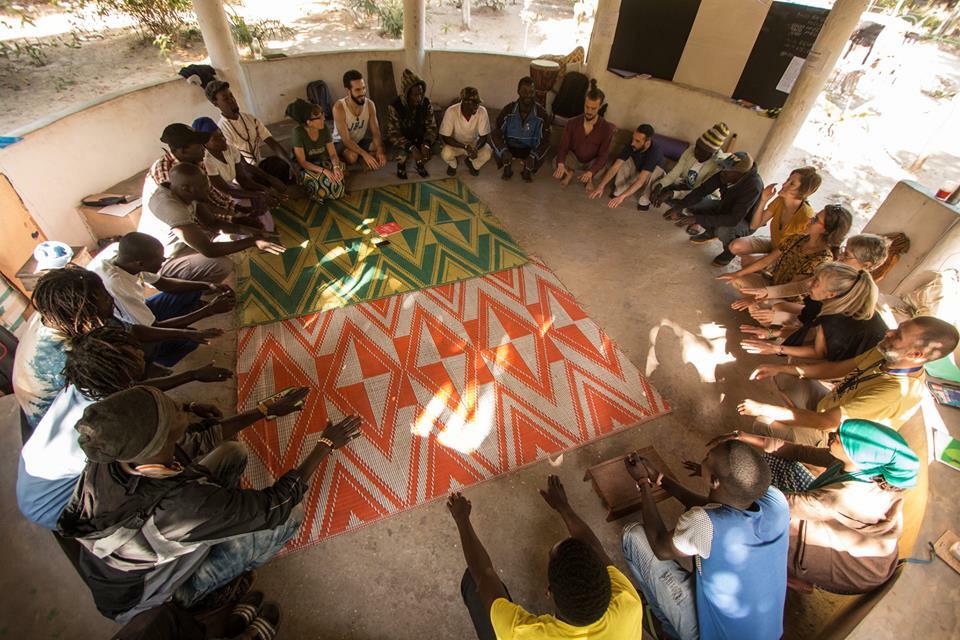 Permakabadio Permaculture Training, Bindoula, Kabadio Village, The Casamance, Senegal, December 2019
Permakabadio Permaculture Training, Bindoula, Kabadio Village, The Casamance, Senegal, December 2019